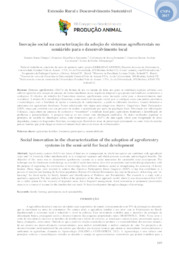Inovação social na caracterização da adoção de sistemas agroflorestais no semiárido para o desenvolvimento local.
Inovação social na caracterização da adoção de sistemas agroflorestais no semiárido para o desenvolvimento local.
Author(s): OLÍMPIO, Z. S.; FERNANDES, F. E. P.; FERNANDES, C. de S.; CAVALCANTE, F. R. A.; ALBUQUERQUE, L. de F.
Summary: Resumo: Sistemas agroflorestais (SAF?s) são formas de uso ou manejo da terra, nos quais se combinam espécies arbóreas com cultivos agrícolas e/ou criação de animais, de forma simultânea ou em sequência temporal e que promovem benefícios econômicos e ecológicos. O objetivo do trabalho foi Caracterizar sistemas agroflorestais como inovação social para o desenvolvimento rural sustentável. A técnica foi à metodologia Sustentare, como modelo de inovação social, pois se configura como uma prática epistêmica e metodológica, com a finalidade de apoiar a construção de conhecimentos, a partir de diferentes interfaces visando fortalecer a autonomia dos agricultores familiares. Foram selecionadas três etapas para atingir esse objetivo: Diagnóstico Rural Participativo (DRP), etapa que contribui com um processo de análise e aprendizado por parte da população local; Devolução das Informações Coletadas, etapa-chave no processo de conhecer e ?reconhecer? a realidade local pelos agricultores familiares e identificação de problemas e potencialidades. A pesquisa trata-se de um estudo com abordagem qualitativa. Os dados analisados seguiram os princípios do modelo de abordagem acima, onde demonstrou que os SAF?s são uma opção viável para recuperação de áreas degradadas, manejo de fragmentos florestais, recomposição florestal em áreas de preservação permanente ou como fonte de receitas para as famílias que pode chegar ao desenvolvimento local através de trocas de conhecimentos. [Social innovation in the characterization of the adoption of agroforestry systems in the semi-arid for local development] Abstract: Agroforestry systems (SAFs) are forms of land use or management, in which tree species are combined with agricultural crops and / or livestock, either simultaneously or in a temporal sequence and which promote economic and ecological benefits. The objective of this study was to characterize agroforestry systems as a social innovation for sustainable rural development. The technique was the Sustentare methodology, as a model of social innovation, since it is an epistemic and methodological practice, with the purpose of supporting the construction of knowledge, from different interfaces aimed at strengthening the autonomy of family farmers. Three stages were selected to achieve this objective: Participatory Rural Diagnosis (DRP), a step that contributes to a process of analysis and learning by the local population; Return of Collected Information, key step in the process of knowing and "reknowing" the local reality by family farmers and Identification of Problems and Potentialities. The research is a study with a qualitative approach. The data analyzed followed the principles of the above approach model, where it was demonstrated that SAFs are a viable option for the recovery of degraded areas, forest fragment management, forest restoration in permanent preservation areas or as a source of income for the families that can reach To local development through exchanges of knowledge
Publication year: 2017
Types of publication: Paper in annals and proceedings
Unit: Embrapa Goats & Sheep
Observation
Some of Embrapa's publications are published as ePub files. To read them, use or download one of the following free software options to your computer or mobile device. Android: Google Play Books; IOS: iBooks; Windows and Linux: Calibre.
Access other publications
Access the Agricultural Research Database (BDPA) to consult Embrapa's full library collection and records.
Visit Embrapa Bookstore to purchase books and other publications sold by Embrapa.

